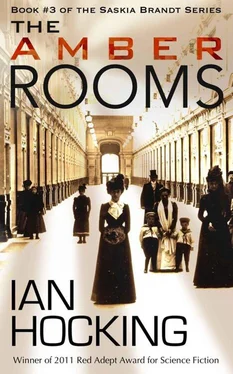As the minutes drew on, Pasha staggered with fatigue and sheathed his sword. He searched for her with the lamp alone. Silently, she ascended a tree and held her breath. Pasha had lost his enthusiasm for the search. He returned to the observatory.
Saskia considered. Soso and Kamo would be bound for Finland. Her priority was to give chase. But without Pasha, or help from someone like him, that would be almost impossible.
‘Ego, do I have a field kit hidden somewhere, or a cache containing items like these glasses, and certificates of conduct?’
‘Yes.’
‘Will you tell me where it is?’
‘Certainly not.’
Saskia dropped from the tree and left Pasha in the observatory beneath the pale scintillations. She thought of Mount Tupungato in the far Andes, whose name meant “a place to observe the stars” in the Quechua language. Somewhere, she was certain, Kamo was looking up at the Runaway Star. She leaned into the growing wind and hurried down to the river. There, she found two Hacker motorboats. If she hurried, she could make the last train to Helsinki.
Within the hour, Saskia found herself in the perfect dark that occluded the west side of the Finland Station, not far from its Royal Pavilion. The motor boat had been a wise choice of vehicle. There were many soldiers on the roads. Their activity had disturbed the habits of nightwalkers such as footpads and prostitutes, as well as curious onlookers fresh from the theatres. The first architects of St Petersburg had intended the waterways to serve in lieu of roads, and Saskia had taken the motorboat east along the Karpovka to the Neva, and then to the mainland Vyborsky District with no great trouble beyond some shouts from the St Sampson Bridge. Along the way, she saw emergency lanterns hung outside government buildings.
Now, she heard the night train to Helsinki disgorge vapour with a monstrous sigh. If she turned, she would see the mist spill across the extreme of the platform, beyond a fence. The train would leave the station in four minutes. Saskia intended to catch it by vaulting the fence, running alongside, and snagging a handle using a bundle of three crooked walking sticks, which she had stolen for the purpose from the hospital to the west of the station.
It was a poor plan. She might be able to board the train as it left the station. She might even succeed in overcoming the guard in the baggage compartment. But the train and its passengers would receive the closest attention at the border. Her attack on the baggage guard, or whatever method of incapacitance came to mind when the moment presented itself, would be noticed.
She stamped her feet to warm them.
‘Ego,’ she whispered, ‘I need to get aboard that train and remain on it until Helsinki.’
‘That,’ said Ego, ‘will be exceptionally difficult.’
‘Any suggestions?’
‘No.’
‘And there was me thinking we’d made friends.’
Ego did not reply.
Saskia hugged herself against the cold. She still wore Pasha’s cape, but the air was damp and the warmth of her brisk walk from the hospital waiting room had left her.
Doors were slammed along the length of the train. Saskia swore. She prepared to release the cloak, which would encumber her dash. She held the three walking sticks in her left hand. One should be able to bear her weight, even if the train tugged her more violently than she anticipated. Three was for certainty. She looked at the fence. It was too high for a clean jump. She would need to vault it, putting her weight on a post. To be thorough, she should walk over and test the strength of the post, but she had no more time remaining. In less than twenty seconds, she would need to burst from the darkness and board the train.
She closed her eyes and rehearsed the plan once more. Her window was ten seconds plus or minus two. She had to run alongside the train until it was far enough from the station to be obscured by the dark; only then could she approach the rear, with its vestibule and other prominent holds, and climb aboard. The speed would be too great for her hand grip to bear. The walking sticks would serve in lieu.
Saskia heard the platform guard blow his whistle. She prepared herself. The train, snorting, began to pull out. She watched the locomotive and the first carriage slide past her. Eight carriages to go.
‘Ms Tucholsky!’ called a man.
Saskia recognised the voice. For a moment, she looked at the train, and decided to let it pass. The brute-force approach had never appealed much anyway. She moved to the edge of the pavilion and peered around the corner, dazzled by the smoke-scattered light of the platform. There was a dozen people. Two of them might have been Tsarist agents. Pasha was standing half way along. He wore a long coat and a workman’s cap. As she watched, wondering why he did not wear his uniform, the smoke obscured his despondent face, then his form entirely.
She dropped the walking sticks and hurried along the platform before the smoke dissipated. Her eyes were closed. She found Pasha by dead reckoning, took his hand, and led him to a quiet place on the platform near its southern extreme and beneath a basket of flowers.
‘What are you doing here?’ she said.
As Pasha’s mouth widened into a smile, Saskia felt an answering relief at her core. The loss of his trust had wounded her more deeply than she realised. Now, at the prospect of its return, she felt overwhelmed.
Pasha took an oilskin diary from his pocket.
‘Father once said that nothing is unknown to Plato,’ he said in a low voice. ‘I found this beneath Plato’s bust in the observatory. It tells me that our friend has not been at home for many months. People wanted to see him there, and you know he doesn’t like crowds.’
It took her several seconds to understand that Pasha was telling her Lenin had left Finland. She had almost caught the wrong train. She threw her arms around Pasha’s neck.
‘Follow my lead,’ she whispered. ‘Hug me back.’
They were both bundled against the cold, but she held him until their warmths met.
‘I haven’t fallen asleep,’ she said into his collar. ‘I’m thinking.’
‘What about?’
‘Where can our friend be?’
Saskia felt more than heard Pasha chuckle. ‘The same place every Russian goes for some peace, quiet and sedition.’
So Lenin was in Switzerland. Soso and Kamo would take the money there. Behind her cold reception of this information, she noted that her mistake resulted from rash analysis. Kamo had always claimed that the money was destined for Tampere, Finland, but what did Kamo know of Lenin’s whereabouts? He knew only what he was told, and he was given information by a person even more paranoid than himself: Soso. In future, she must be more thorough in her analysis.
‘How do you know this?’ she asked, releasing him. She checked the platform with a glance. It was empty. But she maintained a concern about the two gentlemen she had identified as potential agents. St Petersburg was being locked down following the Summer Palace burglary. It made sense that the train station would be surveilled. They continued to hold hands.
Pasha swallowed. His effort to avoid tears made his mouth thin. He leaned towards her and said, ‘I must say one thing about my father, Ms Tucholsky. I had no idea about his connection to the socialists. I knew he was a free thinker, but that was the extent of my knowledge. To think how well the Tsar treated him, and us, as a family. His Majesty sent me a personal note of congratulation on my appointment to the Imperial Guard. What can I make of all this?’
‘You read his diary already? We parted less than an hour ago.’
Pasha gave her a disappointed look. ‘Ms Tucholsky, you are talking to the only person to have turned down a mathematics fellowship at the Menshikov Lyceum. Father’s code is complex but systematic. After a few minutes, I had it. Should you like to know it?’
Читать дальше












